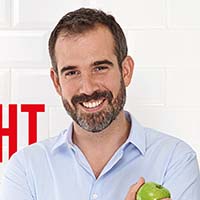-
Doctors and identical twin brothers Xand and Chris van Tulleken are familiar faces to many across Australia and the UK. When they’re not practising medicine in conflict zones or working in humanitarian crises, the charismatic pair present TV programs about all aspects of health, medicine and lifestyle – most notably, Operation Ouch!
Based on his latest show, How to Lose Weight Well, Xand has now released a new book providing a step-by-step, evidence-based method of losing weight and keeping it off. There’s a personal touch too – the doctor used this approach himself in 2009 when he found his weight had crept up on him.
The book outlines a simple plan for healthy eating, minus gimmicks and fad-diets. Here, Xand takes a few minutes to share some key tips.
What’s the definition of a fad diet?
A fad diet doesn't endure – it’s briefly popular because it has some attention-seeking device or celebrity endorsement. They fail because they focus what you eat rather than how you live. They don’t work long term, and are replaced with a new fad.
Why do you think people try fad diets instead of evidence-based recommendations?
Because the evidence has been pretty hopeless. If you look at the medical community recommendations, it has been confusing, hard to follow and frequently wrong. I grew up believing low fat foods were healthy, and eggs (which are full of cholesterol) were dangerous. Neither is true. It’s hard to get clear dietary (let alone weight loss) advice, so people resort to fad-diets.
Even after six years of medical training and a degree, I get easily confused and seduced. While there’s reliable general food info out there, it’s not specific to weight loss, so I’ve covered that in my book.
"Ask yourself why you're overweight, start keeping a food diary (including alcohol) and stop eating junk food. Don't hate yourself and don't worry about your appearance."
In your opinion, what have been some of the worst fad diets?
Paleo is pretty daft. It combines bad evolutionary biology with unhelpful aspects of gender and eating – it's seen as a "manly" diet. I also particularly dislike the alkaline diet because it so completely fails to understand how your body manages an alkali balance. To be honest I don’t like any of them.
I like home cooked meals that taste amazing and I think it's important to engage with what aspects of your life have made you gain weight. For me, it was stress and loneliness.
What are the key things you’ve taken from your research about weight loss?
That it’s possible! And that fasting isn't bad for you and that hunger is surprisingly tolerable. And that junk food affects your brain in unique ways that make it – for some people – almost irresistible.
How does a weight-loss versus a health-benefits focus impact healthy eating for people?
Focusing purely on weight loss (and resorting to fad diets) is a recipe for misery, low self-esteem and a diet lacking in important nutrients. We all need enough calcium and fat soluble vitamins. You can lose weight eating only cabbage but it won't be the right kind of weight, and you'll gain it back quickly.
What is your first piece of advice for people who want to lose weight?
Ask yourself why you're overweight, start keeping a food diary (including alcohol) and stop eating junk food. Don't hate yourself and don't worry about your appearance. People won't love you more when you're lean – but you will feel better.
Learn more about Dr Xand’s weight loss plan in How to Lose Weight Well, published by Hardie Grant Books and available from vantullekenbrothers.com
A smarter way to lose weight

-
Mental fitness explained
Just as you work to strengthen your body, your mental health deserves attention and exercise too.
-
Signs it's time to visit the dentist
Nobody wants to go. But there are good reasons to – promise.
-
The link between stress, anxiety and jaw pain
Physiotherapist Michael Chan explains how stress and anxiety can cause jaw pain, and how to help get some relief.
-
When you can't sleep next to your partner
You love everything about them – except their sleep habits.
-
The 7 best sleep apps
7 apps for deep restorative sleep
-
5 ways to relieve stress
Discover 5 easy stress-relief techniques to calm your mind and body. Try exercise, breathing, outdoor time, positive self-talk, and more for a balanced life.
Subscribe to receive the best from Live Better every week. Healthy recipes, exercise tips and activities, offers and promotions – everything to help you eat, move and feel better.
By clicking sign up I understand and agree to Medibank's privacy policy



.jpg)


